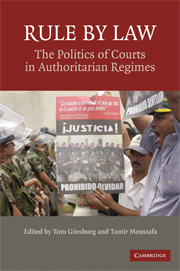Book contents
- Frontmatter
- Contents
- Contributors
- Introduction: The Functions of Courts in Authoritarian Politics
- 1 Of Judges and Generals: Security Courts under Authoritarian Regimes in Argentina, Brazil, and Chile
- 2 Administrative Law and the Judicial Control of Agents in Authoritarian Regimes
- 3 Singapore: The Exception That Proves Rules Matter
- 4 Agents of Anti-Politics: Courts in Pinochet's Chile
- 5 Law and Resistance in Authoritarian States: The Judicialization of Politics in Egypt
- 6 Courts Out of Context: Authoritarian Sources of Judicial Failure in Chile (1973–1990) and Argentina (1976–1983)
- 7 Enforcing the Autocratic Political Order and the Role of Courts: The Case of Mexico
- 8 The Institutional Diffusion of Courts in China: Evidence from Survey Data
- 9 Building Judicial Independence in Semi-Democracies: Uganda and Zimbabwe
- 10 Judicial Power in Authoritarian States: The Russian Experience
- 11 Courts in Semi-Democratic/Authoritarian Regimes: The Judicialization of Turkish (and Iranian) Politics
- 12 Judicial Systems and Economic Development
- 13 Courts in Authoritarian Regimes
- References
- Index
13 - Courts in Authoritarian Regimes
Published online by Cambridge University Press: 05 June 2012
- Frontmatter
- Contents
- Contributors
- Introduction: The Functions of Courts in Authoritarian Politics
- 1 Of Judges and Generals: Security Courts under Authoritarian Regimes in Argentina, Brazil, and Chile
- 2 Administrative Law and the Judicial Control of Agents in Authoritarian Regimes
- 3 Singapore: The Exception That Proves Rules Matter
- 4 Agents of Anti-Politics: Courts in Pinochet's Chile
- 5 Law and Resistance in Authoritarian States: The Judicialization of Politics in Egypt
- 6 Courts Out of Context: Authoritarian Sources of Judicial Failure in Chile (1973–1990) and Argentina (1976–1983)
- 7 Enforcing the Autocratic Political Order and the Role of Courts: The Case of Mexico
- 8 The Institutional Diffusion of Courts in China: Evidence from Survey Data
- 9 Building Judicial Independence in Semi-Democracies: Uganda and Zimbabwe
- 10 Judicial Power in Authoritarian States: The Russian Experience
- 11 Courts in Semi-Democratic/Authoritarian Regimes: The Judicialization of Turkish (and Iranian) Politics
- 12 Judicial Systems and Economic Development
- 13 Courts in Authoritarian Regimes
- References
- Index
Summary
THE EXPANSION OF JUDICIAL STUDIES
This project represents something of a high watermark in the study of law and courts in general and judicial review in particular. Not so very long ago nearly every student of the politics of law and courts concentrated on the constitutional decisions of the U.S. Supreme Court. The very preoccupation with constitutional judicial review has led, in recent years, to more study of lands beyond the United States as constitutional courts and constitutional judicial review, or something very like it, spread to other democratic regimes, particularly after World War II. What once appeared to be a piece of American exceptionalism came into play in most European, continental, democratic states; and in the European Union and the European Convention on Human Rights; in more and more English-speaking countries; and in some Asian democratic states. Overseas realities eventually forced scholars to go beyond their American preoccupations.
At the same time, the very concerns with the politics of law and courts, or the judicial role in politics, that had so dramatically called our attention to the constitutional law of the U.S. Supreme Court and then to other constitutional law and courts eventually lead us to nonconstitutional courts of law, because it could hardly be denied that all sorts of American and foreign courts made significant public policy decisions in all sorts of cases involving all sorts of law.
- Type
- Chapter
- Information
- Rule by LawThe Politics of Courts in Authoritarian Regimes, pp. 326 - 336Publisher: Cambridge University PressPrint publication year: 2008
- 23
- Cited by

